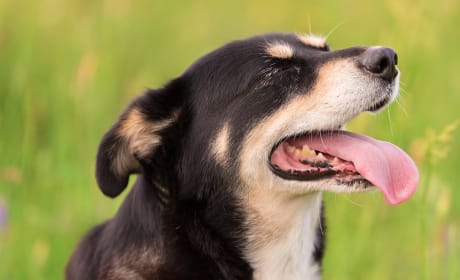Why should I have my dog's teeth cleaned?
It may not be something that you have ever thought about, but your dog's oral health is a key element of their overall health. Typically, by the age of 3 most dogs begin showing signs of periodontal disease (gum disease), which can have serious negative consequences for their physical health and wellbeing.
As with people, periodontal disease in dogs has been linked to heart disease (after the bacteria enters the bloodstream from the mouth) and damage to other organs, not to mention the pain that can be caused by eroded gums, and missing teeth.
At-home oral health care routines paired with dental treats can go a long way to helping your pooch to clean their teeth, as well as helping to control the buildup of plaque and tartar. Nonetheless, the best way to maintain your dog’s clean and healthy mouth is to visit the vet to have their teeth professionally cleaned.
Skipping annual professional cleaning could put your dog at risk of developing gingivitis, periodontal disease, bad breath, and in severe cases pain and tooth loss.
What happens during a professional teeth cleaning?
To help prevent your dog from developing tooth decay and periodontal disease, our Memphis vets recommend bringing your dog in for a dental appointment at least once each year, or more frequently if they are experiencing dental problems.
Just like going to your dentist, when you bring your dog to Southwind Animal Hospital for a dental checkup our vets will perform a full oral examination for your pup and look for signs of dental issues, such as:
- Extra teeth or retained baby teeth
- Bleeding around the mouth
- Swelling or pain in or around the mouth
- Plaque or tartar buildup on teeth
- Discolored teeth
- Loose or
- Broken teeth
- Bad breath
Contact your vet if you spot symptoms of periodontal disease in your pet, such as reduced appetite (which could indicate tooth pain), abnormal chewing, drooling, dropping food from the mouth, bad breath or other symptoms.
Our vets assess all pets to ensure they are healthy enough to have anesthesia, and conduct additional diagnostics if required. Once your pet is safely anesthetized, we will perform a full oral exam (tooth-by-tooth) complete with charting, (just like your dentist does during your examinations).
While we have your pet safely under anesthesia, we clean and polish their teeth, both above and below the gum line. We probe and x-ray the teeth, then to help protect against future damage we use a fluoride treatment before applying a dental sealant to fight plaque.
If your dog is suffering from advanced periodontal disease, we will work with you to develop a treatment plan to help restore your dog's optimal oral health.
How can I help to keep my dog's teeth clean?
Pet parents play a pivotal role in helping their pets fight dental disease. Here are a few easy ways that you can help to keep your dog's teeth clean and healthy:
- Use a finger brush from your vet, or a child’s toothbrush to brush your pet’s teeth daily to remove any plaque or debris.
- Use a plaque prevention product (your vet can recommend some), which you can apply to your pet’s teeth and gums. These products act as a barrier to prevent plaque buildup.
- Offer your pup treats such as dental chews or food designed to help prevent plaque buildup and tartar.
Dental care is an important part of your pet's overall health. Be sure to book your pet's annual appointment today, your dog will thank you.
Is your dog due for an annual dental exam? Our Memphis vets can check your pet's oral health to ensure that their teeth are in good condition and that their mouth is healthy. Contact us today.

Looking for a vet in Southeast Memphis?
We're always accepting new patients, so contact our veterinary hospital today to book your pet's first appointment.
Related Articles View All
How can a dog get rabies? What are the signs?
Rabies is a fatal, highly contagious, virus that can affect dogs, cats, livestock and humans! What are the signs your dog has rabies? What should you do? Read on to find out.
Signs that Your Dog May Have an Ear Infection
Dog ear infections need treatment quickly to prevent the condition from becoming more severe, or causing recurring infections in the future. So, how can you tell if your dog has an ear infection? Read on to find out.
How often should I take my dog to the vet?
Taking your dog to the vet regularly is a proactive way to help your pet live a long and healthy life, but how often should you take your dog to the vet? And, how can you save money on these routine appointments? Read on to find out.
Puppy Shots Schedule - When To Get Your Puppy Vaccinated
Vaccinations play an essential role in protecting your puppy's health in their first year of life. Here, you will find vital information about puppy vaccines and a schedule to help you plan for your puppy's shots.
Should I microchip my dog?
If your dog is lost or stolen, a microchip sitting under their skin can increase their chances of being returned to you. Not sure if you should get your four-legged friend microchipped? Below, we look at some of the reasons why many vets recommend microchipping for dogs.

